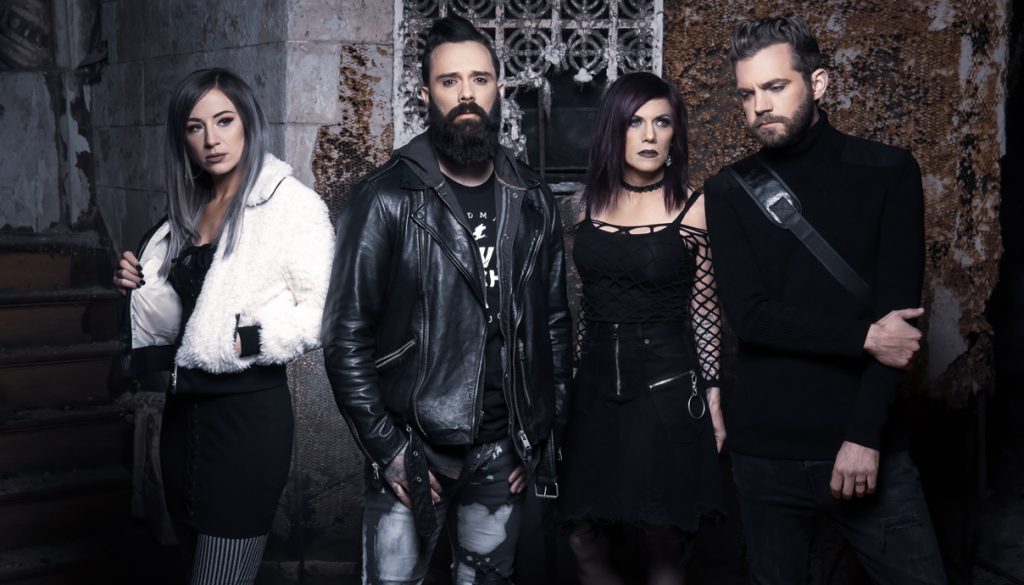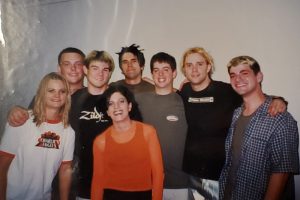INTERVIEW: Skillet’s John Cooper discovers ‘Eden’ on the search for victory

Skillet. Photo courtesy of Chrissy Knix.
John Cooper speaks with enthusiasm about Skillet‘s status as “the biggest-selling band you’ve never heard of.” Earlier this summer, the band’s frontman and cofounder received a call he never expected. The caller, from Pandora, informed him that Skillet had been inducted into the streaming platform’s “Billionaire’s Club.” It’s a distinction reserved for artists streamed more than 1 billion times. A second call followed the first. It turned out Pandora had made an accounting error. Skillet didn’t cross 1 billion streams, but 2 billion.
“I could not believe it. To me it just shows the level of hardcore fandom that the Skillet base has, because Skillet is still not a household name,” Cooper says.
The number is a testament to the band’s workhorse philosophy both in the studio and on the road over its 23-year career.
“People have either never heard of the band, or else they’re fans that listen every day to records that are 10 years old,” Cooper jokes about the feast or famine of Skillet fandom.
Earlier this month, Skillet released its 10th studio album, Victorious, a modern hard rock soundtrack set to the struggle to overcome and the will to triumph in the face of adversity.
One of the keys to the band’s longevity has been a willingness for constant evolution of its sound, from grunge to industrial rock and gradually heavier and heavier. On the new album, Cooper, and the band’s keyboardist (and his wife) Korey Cooper produced the record; a first for the band. Cooper says the evolution comes through experimentation and a fearlessness of trying new ideas while recording, including elements of hip-hop, electronica and R&B.
“The rock and roll music world is quite conservative in terms of what you’re not allowed to change, and Skillet has always been open to that,” he says. “If there’s a guitar riff that might sound really cool with a keyboard doing it as well, a lot of rock bands would not be into that because it’s not purist rock and roll.”
Throughout the experimentation, the heart and soul of Skillet’s identity comes from its lyrics and vocal performance, as well as the massive production and live performance. That was born from Cooper’s ambivalence to ’90s grunge navel-gazing.
“In the ’90s, it was cool to not really care,” Cooper says. “There were these bands that would sit around too depressed to care [about] what they were playing.”
Growing up in the ’80s, Cooper was inspired by the over-the-top bombast of bands like Kiss, Def Leopard and Bon Jovi. Those bands were big, loud and most importantly, fun. Cooper dreamed of one day having a band with both a means and draw to do the same. While Skillet quickly became known for its intense live shows, the production took several albums to catch up—that’s because Skillet rose as a gospel band, playing primarily churches and Christian music festivals.

This publication’s editor, Roman Gokhman (far right) and friends with an early incarnation of Skillet circa 2000 or 2001 at a church concert in Salem, Oregon. Everyone bleached their hair back then, OK?
“When we got big enough to have a little bit of money and a stage that was big enough to start spending that money, it created this word of mouth where fans felt like they had to experience Skillet live,” Cooper says. “At the time, there weren’t a lot of bands doing the big rock show. It set us apart a little bit.”
Through numerous lineup changes—Cooper is the only original member, and Korey Cooper has been around since the second album, Hey You, I Love Your Soul— the band fostered an all-in-the-family dynamic that has not only made Skillet stronger but encouraged the band members to pursue their solo passions.
Cooper and guitarist Seth Morrison, for example, have a metal band called Fight the Fury. Both Coopers also contributed to drummer Jen Ledger’s solo EP. Ledger has opened shows for Skillet. The band is proud of its family-driven mentality.
“You’ll never see Skillet trying to put another band down,” he says. “I’m of the thinking that if we make an amazing Ledger album, then that’ll help Skillet, too. Hey, if Ledger gets bigger than me, it probably helps me get bigger, too!”
In addition to Victorious, Cooper speaks with an equal enthusiasm about the band’s latest project, a graphic novel called “Eden.” It’s something Cooper has always wanted to do, but didn’t know how to go about doing it. He worked with a team of writers and illustrators, and based the premise on themes shared in Skillet songs, which he says will be relevant to the band’s fans worldwide.
The story is action-packed and rooted in science fiction philosophy, which Cooper says was a natural complement to the message of faith the band brings.
“I’m probably more excited about this comic than I should be,” Cooper says. “It’s one of my proudest things of my career. … Most great science fiction kind of deals with religious ideals by nature,” he says. “‘The Matrix,’ ‘Blade Runner’— all those have a lot of what I would call theology and philosophy in them, and I really love that.”
The band is far and away one of the top names on the Christian rock circuit, perpetually headlining faith-based festivals. While much of the foundation of Skillet’s fan base is rooted in spiritual devotion, another set has discovered the band through Spotify playlists. It’s a dichotomy of which Cooper is aware and welcomes.
“I think a lot of people don’t know that Skillet sings about religious things, and I’ve always been fine with that,” he says. “I never wanted to sing only to Christian people; I just wanted to sing songs about what I believed, and some of those songs are not even spiritual.”
The album includes love songs, songs about family, and more politically leaning topics like gun control and mass shootings. The singer views music as having a strength or quality that changes lives for the better that doesn’t necessarily need to get someone to go to church. He recalls one recent story about fan being convinced to enter drug rehab and staying sober for four years afterward.
“I believe music is a force for good,” he says. “Whether you’re religious, not religious, even anti-religious—most people agree that music has a supernatural quality to it.”
Follow writer Mike DeWald at Twitter.com/mike_dewald.
